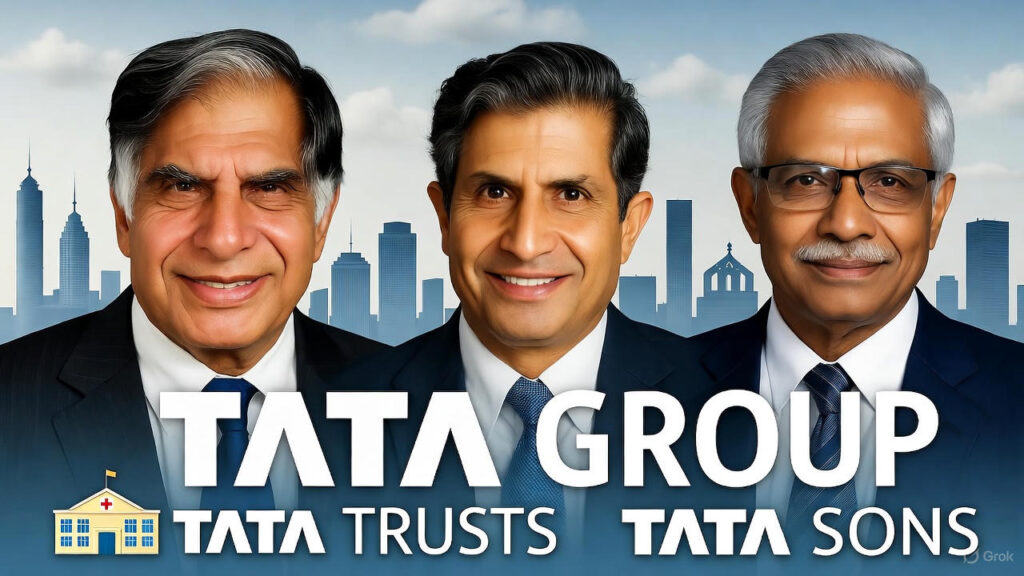The Tata Group, one of India’s most revered conglomerates, has long been synonymous with ethical business practices, philanthropy, and industrial innovation. Founded in 1868 by Jamsetji Tata, the group spans industries from steel and automobiles to IT services and consumer goods. However, a year after the death of its iconic leader, Ratan Tata, in October 2024, the organization finds itself navigating internal discord. This blog examines the ongoing issues within the Tata Trusts and Tata Sons, providing a clear breakdown of their structures and holdings for better context.
Understanding Tata Sons: The Holding Company at the Core
Tata Sons Private Limited serves as the principal investment holding company and promoter of the Tata Group’s diverse portfolio. Established in 1917, it holds significant stakes in over 100 operating companies, including 29 publicly listed entities as of August 2025. Tata Sons derives its revenue primarily from dividends from these affiliates and oversees the use of the ‘Tata’ brand through agreements that emphasize ethical governance, such as the Tata Code of Conduct and Tata Business Excellence Model.
Key holdings include:
- Tata Consultancy Services (TCS): Approximately 71.9% stake.
- Tata Steel: 33.2% (including partly paid shares).
- Tata Motors: 30.9% equity, with effective voting rights at 35.8%.
- Tata Power: 33.0%.
- Indian Hotels Company (IHCL): 39.1%.
- And others, such as Tata Chemicals (30.8%), Tata Communications (48.9%), and Titan Company (25.0%).
Tata Sons’ governance philosophy prioritizes transparency, accountability, and stakeholder interests, ensuring each affiliate operates independently under its own board while adhering to group-wide ethical standards.
Tata Trusts: The Philanthropic Powerhouse and Majority Owner
Tata Trusts comprise a collection of philanthropic organizations that own 66% of Tata Sons’ equity share capital, channeling profits into social causes such as education, health, livelihood generation, art, and culture. This unique structure ensures that a substantial portion of the group’s wealth supports societal development, embodying the Tata family’s commitment to philanthropy since 1892.
The major trusts and their approximate holdings in Tata Sons (based on shareholding patterns) are:
- Sir Dorabji Tata Trust: 27.98% (113,067 shares).
- Sir Ratan Tata Trust: 23.56% (95,211 shares).
- JRD Tata Trust: 4.01% (16,200 shares).
- Tata Education Trust: 3.73% (15,075 shares).
- Tata Social Welfare Trust: 3.73% (15,075 shares).
- RD Tata Trust: 2.19% (8,838 shares).
- MK Tata Trust: 0.60% (2,421 shares).
- Sarvajanik Seva Trust: 0.10% (396 shares).
Other shareholders include the Shapoorji Pallonji Group (18.38% total), various Tata Group companies (approximately 13%), and minor stakes held by Tata family members, such as Noel Tata (1.00%) and the late Ratan Tata (0.83%). This ownership gives Tata Trusts immense influence over Tata Sons’ board and strategic decisions, as trustees nominate directors and guide the group’s philanthropic direction.
The Current Storm: Infighting and Governance Challenges
A year after Ratan Tata’s demise, the Tata Trusts are grappling with unprecedented internal disagreements among its trustees, marking a new chapter in the group’s history of occasional boardroom battles. Under Chairman Noel Tata (Ratan Tata’s half-brother), the trusts have seen tensions escalate over board nominations to Tata Sons, funding decisions, and regulatory compliance.
Key issues include:
- Board Nomination Disputes: In September 2025, trustees voted against reappointing Vice Chairman Vijay Singh to the Tata Sons board, highlighting rifts among senior members like Mehli Mistry, Pramit Jhaveri, and Jehangir Darius Khambata. This echoes the 2016 ouster of Cyrus Mistry, which was resolved by the Supreme Court in 2021.
- Funding Controversies: A ₹1,000-crore capital infusion into Tata International Limited (chaired by Noel Tata) has sparked allegations of inadequate consultation and potential breaches of protocol.
- Public Listing Dilemma: The Reserve Bank of India (RBI) classified Tata Sons as an upper-layer non-banking financial company in 2022, mandating a public listing by September 30, 2025. The deadline has passed without action, raising concerns about regulatory repercussions and further straining relations between Tata Trusts and Tata Sons.
- Government Intervention: Indian ministers have met with trustees, urging a swift resolution to the disputes, underscoring the group’s national importance.
These conflicts have led to a perceived power struggle, with some sources describing it as a “boardroom tangle” that could deepen divisions.
Implications for the Tata Legacy and Future Outlook
The ongoing turmoil poses risks to the Tata Group’s stability, potentially affecting investor confidence and operational focus across its $165 billion empire. However, recent developments offer glimmers of hope: The Tata Trusts has reportedly approved a third term for N. Chandrasekaran as Chairman of Tata Sons, signaling continuity amid the chaos.
As the group grapples with succession and power dynamics, the core question remains: Will the Tata legacy of philanthropy and ethical leadership endure?

